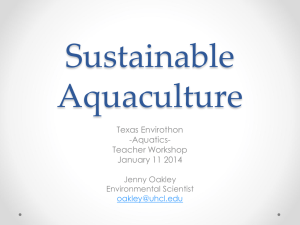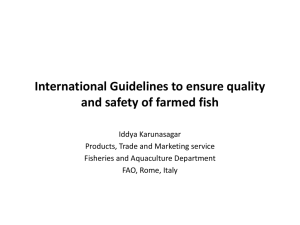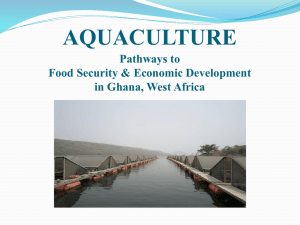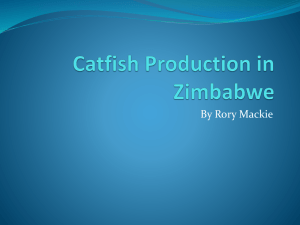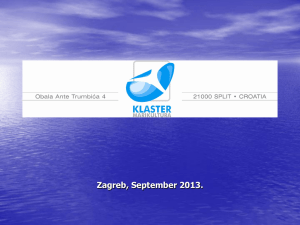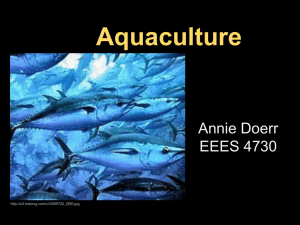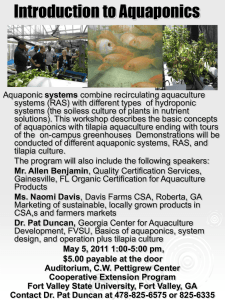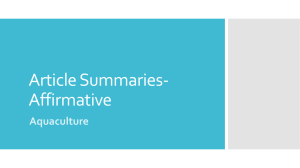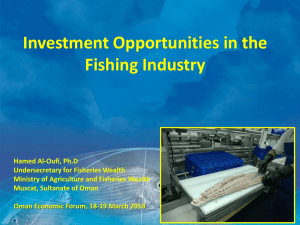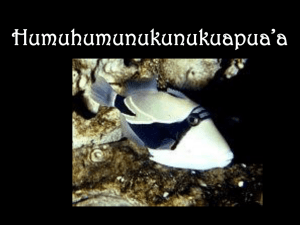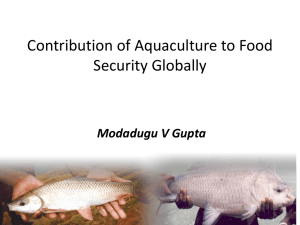Investment Opportunities in Aquaculture Value Chain
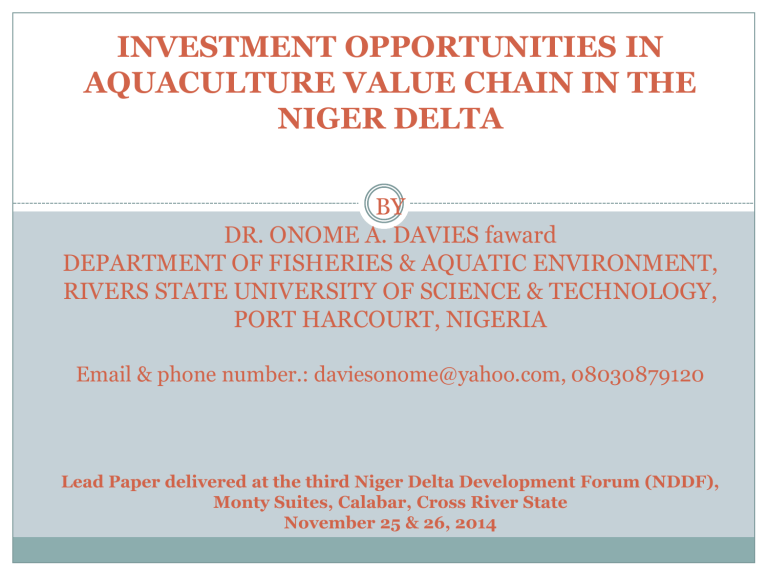
INVESTMENT OPPORTUNITIES IN
AQUACULTURE VALUE CHAIN IN THE
NIGER DELTA
BY
DR. ONOME A. DAVIES faward
DEPARTMENT OF FISHERIES & AQUATIC ENVIRONMENT,
RIVERS STATE UNIVERSITY OF SCIENCE & TECHNOLOGY,
PORT HARCOURT, NIGERIA
Email & phone number.: daviesonome@yahoo.com, 08030879120
Lead Paper delivered at the third Niger Delta Development Forum (NDDF),
Monty Suites, Calabar, Cross River State
November 25 & 26, 2014
INTRODUCTION
FGN intervention to increase fish production in the Niger
Delta started in 1962 and continue this date [Aquaculture
Transformation Implementation Plan under Agricultural
Transformation Agenda (ATA)].
States Govt. & privates investors buy this idea as the years go by (especially from 2003).
Brackish Water Aquaculture Station, Buguma- 1962-
1967, interruption due to Civil War, 1970-date.
African Regional Aquaculture Centre for Nig. Inst. For
Oceanography & Marine Research (ARAC/NIOMR) (3 stations: Aluu, Buguma & Sapele)-1980-date.
Songhai farms, Rivers State Sustainable
Development Agency (RSSDA) Community Fish
Farms, ONIDA (Buguma Fish Farm Nig. Ltd),
Ellah Lakes & a number of other private farms in
Rivers State.
Songhai farms, United Ufuoma Fish Farmers
Association (UUFFA), Delta State Development
Project (DIDP), Accelerated Artisan Fish
Production Project (AAFPP) Aghogho Farms
(WRS) in Delta State.
Bayelsa Investment Promotion Agency (BIPA)
(Epie Creek Aquaculture Project, Etegwe
Aquaculture Project), Niger Delta Seafood
(Hatchery for catfish & tilapia, cage culture) & a number of other private farms in Bayelsa State.
Songhai Cross River Initiative (SCRI), Fadama lll
Project, Growth Enhancement Support Scheme
(GES) in Cross River State.
National Fadama Development Programme – III in
Akwa Ibom State.
Accelerated Artisan Fish Production Project
(AAFPP) in Edo.
Aquaculture and Inland Fisheries Project (2005),
AAFPP, in Ondo State.
National Fadama Development Programme – III in
Abia State.
Imo State Agricultural Development Project
(IMADP) in Imo State.
Investment opportunities in aquaculture
(aquatic animals)
Brackish & Inland aquaculture farms (pond, tank, cage, pen, water recirculation system, etc) for finfish (catfish, tilapia, mullets, etc), shellfish (shrimps), other aquatic animals (frogs).
Processing [frozen, smoked, dried, salted, canned, fillets, sausages (fish cake)].
Marketing (live and processed fish for local & export markets).
Fish feed, fishmeal & fish oil (Presently, a large percentage of high quality floating fish feed are imported; about 45,000 metric tons in 2010).
Preservation & storage of fish (cold storage facilities).
Farm equipment (nets, air pumps, aerators, etc).
Tourism (education, sport fishing).
Special eateries/restaurants (point & kill).
Biofuel production (briquettes, biogas).
Organic buffers
Investment opportunities in aquatic plants farming
Green fuel (biogas, briquettes) from aquatic plants (water hyacinth, duckweed, water lily, phytoplankton, etc) for fish smoking.
Feed production (water hyacinth, duckweed, water lily, phytoplankton, zooplankton).
Live food from phytoplankton (Spirulina, Chorella, Scenedesmus) and zooplankton (rotifers, Daphnia and Artemia nauplii).
Organic buffers
Oils, chemical, pharmaceuticals (antibiotics, glucolipids content in bluegreen algae active against HIV/AIDS virus) & polysaccharides from phytoplankton.
Phytoplankton & macrophytes for sewage treatment, water recovery facilities (to remove primary nutrients) & eutrophication control.
Key constraints to aquaculture
Fund (insufficient & wrong disbursement)
Power (erratic or no supply)
Lack of good fisheries infrastructure
Insufficient & quality inputs
Water quality of source water
High cost of production (feed, seed, power supply, labour)
Poor aquaculture practice
Climate change
Insecurity (kidnapping, piracy, poaching) & conflicts
Fish mongers influence on marketing
Inadequate skilled manpower
Incompetent fisheries experts & impostors
Inaccessibility to loans and credit facilities
High interest rate on agricultural loan in commercial banks
Lack of good regulatory and institutional framework for aquaculture development
Lack of knowledge in modern fish handling techniques
Poor transportation strategies
Research (no grants) & poor extension service
Gap between researchers & policy makers
Non-compliance to environmental laws
Corruption
The way forward
Sufficient & right disbursement of fund
Subsidy on inputs
Good aquaculture practice (GAP)
Increase awareness of aquaculture products
Training and manpower development
Government & private supports
Formation of Fish Farmers’ Cooperatives Societies
Access to loans and credit facilities
Promotion of research and extension activities
Effective policies and good institutional framework
Certification of products
Reducing the problems of corruption, insecurity and conflicts
CONCLUSION
Aquaculture value chain offers profitable investment opportunities in the Niger Delta.
Public & private investors are therefore encouraged to tap these opportunities for sustainable fish supply for the increasing population, demand, job creation, poverty alleviation, food security and employment.
Thank you for listening.

